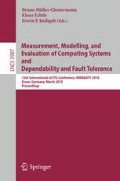Abstract
Energy consumption, the finite horizon of conventional fossile energy resources and maintaining sustainable environmental conditions form the biggest challenges in the near future. Renewable energy sources like wind, water, solar energy or biomass are limited and unsteady substitutes and require a radical rethinking of the energy problem. There are two main solution approaches: power saving and intelligent management of the use of energy. Both require advanced technologies and a close adaption between energy production and energy usage. Information Technologies (IT) themselves account for a major energy consumer by contribution of about 10 % to the global C02 production and will be a target for power saving but Information and Communication Technology (ICT) are the key for the intelligent power management.
The first part of the contribution addresses in a systematic way power consumption in ICT on different levels from hardware and device technologies up to application processes, as well as possible approaches and solutions such as new technologies (such as nanotubes), control of power consumption on the chip level, system level and application level by methods of dynamic power supply, adaptive sleep modes, disabling of temporarily unnecessary functionalities, and network virtualization.
In the second part, the purpose and the architectures of energy information networks will be discussed, a comparatively new approach to monitor and to control the consumption of energy depending on the currently available energy sources (such as wind, solar energy or batteries of automotive vehicles), costs for the energy itself and for its transport to the customer. Such energy information networks can be based on existing communication infrastructures (access networks, sensor networks, core networks) which have to be enhanced by other technologies (such as power line communications) and upgraded with respect to security, privacy protection and reliability.
In the final part, the contribution addresses the specific aspect of performance modelling. From this point of view, the issue can be considered as a resource sharing problem. Examples will be given how queuing theory can be used to optimize the use of resources (such as processors, communication links, storage areas, etc.) under stochastic conditions and dynamic scheduling schemes.
Access this chapter
Tax calculation will be finalised at checkout
Purchases are for personal use only
Author information
Authors and Affiliations
Editor information
Editors and Affiliations
Rights and permissions
Copyright information
© 2010 Springer-Verlag Berlin Heidelberg
About this paper
Cite this paper
Kühn, P.J. (2010). Invited Talk Green IT - The Power Saving Challenge and ICT Solutions . In: Müller-Clostermann, B., Echtle, K., Rathgeb, E.P. (eds) Measurement, Modelling, and Evaluation of Computing Systems and Dependability and Fault Tolerance. MMB&DFT 2010. Lecture Notes in Computer Science, vol 5987. Springer, Berlin, Heidelberg. https://doi.org/10.1007/978-3-642-12104-3_2
Download citation
DOI: https://doi.org/10.1007/978-3-642-12104-3_2
Publisher Name: Springer, Berlin, Heidelberg
Print ISBN: 978-3-642-12103-6
Online ISBN: 978-3-642-12104-3
eBook Packages: Computer ScienceComputer Science (R0)

